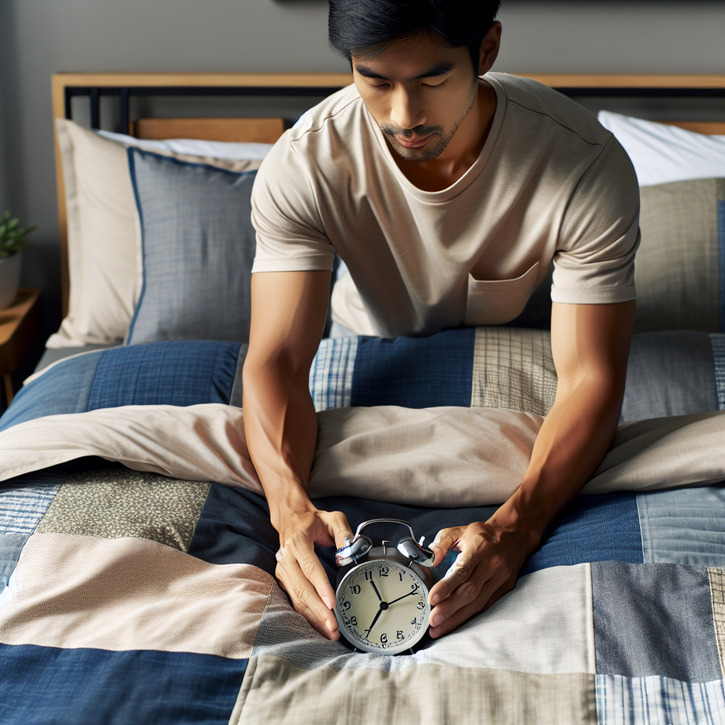Mastering Sleep: Best Practices for Overcoming Sleep Issues

Mastering Sleep: Top Tips to Beat Sleep Troubles
Introduction: Getting to Know Sleep Troubles and Why They Matter
Ever notice how sleep problems sneak into your life without a proper heads-up? They may seem subtle at first, but these issues can really mess with your physical, emotional, and mental well-being. In our super busy world, many of us are hit with sleep struggles—whether it’s having a hard time drifting off, staying asleep, or waking up still feeling groggy. And the effects go way beyond just feeling tired. Getting a handle on your sleep issues is the first big step toward better health and feeling your best.
So, what do we mean when we talk about sleep issues? Basically, this word covers everything from the occasional rough night to long-term disorders that seriously disrupt your sleep. Stress, lifestyle choices, and even the environment around you can all play a role. Without quality sleep, our bodies can’t repair, recharge, or function at their peak. Taking charge means looking at the whole picture—both mind and body.
And here’s something interesting: if you have hearing disorders, sleep issues might be giving you an extra headache. Studies show that sleep disruptions can make hearing problems, like tinnitus, even tougher to handle by kicking up the symptoms. This connection really highlights the need for a balanced routine where good sleep supports not just overall health, but also your auditory well-being. As we dig deeper, you’ll see just how intertwined all these wellness aspects really are.
So, What Exactly Are Sleep Issues?
In simplest terms, sleep issues are any interruptions that mess up our natural sleep rhythm and keep us from that deep, healing slumber we need. This could be anything from insomnia and sleep apnea to restless leg syndrome. Some folks might face a few disrupted nights here and there thanks to stress, while others deal with chronic sleep hurdles that call for a major lifestyle tweak. These aren’t just about feeling a bit sleepy—poor sleep means your body isn’t getting the quality downtime it desperately needs.
How Sleep Issues Affect Your Overall Health
Sleep is crucial—it’s the secret sauce behind good health and smooth-running bodily functions. When we skimp on sleep, our immune system takes a hit, and we become more vulnerable to everything from heart issues and diabetes to mood swings and anxiety. Each sleepless night adds up, throwing off your metabolism and messing with hormonal balance. That’s why chronic sleep issues can lead to irritability and even depression, making it harder to shine at work or enjoy time with loved ones.
Realizing just how important good sleep is can transform the way you think about your health. Sleep isn’t just downtime; it’s a critical part of how our bodies repair and regulate so many essential processes. Tweaking your habits to support healthier sleep can boost your focus, immunity, and even help manage your weight. Prioritizing sleep along with diet and exercise sets you up for a well-rounded approach to a healthier lifestyle.
How Sleep Issues and Hearing Disorders Interact
It might seem odd, but sleep issues and hearing disorders are more connected than you’d think. Many people with hearing problems like tinnitus—where you hear a constant ringing or buzzing—find that their sleep just isn’t the same. That persistent noise can keep the brain from getting into that deep, restorative sleep it craves, leading to a vicious cycle of fatigue and extra sensitivity to sound.
Experts in both sleep and hearing agree: tackling one of these issues can often help the other. Improving your sleep quality might even ease some of those annoying auditory symptoms. This cross-connection really underscores the need for an integrated approach—one that respects both your sleep habits and your auditory health. We'll be sharing a bunch of practical tips on how to get your sleep back on track, benefitting your overall well-being along the way.
Spotting the Common Signs of Sleep Issues
Before you can tackle sleep troubles, it’s important to figure out what’s going wrong. It might be something as simple as having a hard time falling asleep on occasion, or it could be more chronic disruptions that ruin your night. Pinpointing these patterns can make a world of difference in understanding what’s tripping you up. Whether it’s anxiety, a noisy environment, or underlying issues like sleep apnea, catching these clues early is key to fixing the problem.
Different Kinds and Causes of Sleep Issues
There’s no one-size-fits-all when it comes to sleep problems. Insomnia tops the list, making it tough to fall or stay asleep, while others might grapple with sleep apnea—where breathing gets interrupted—or restless leg syndrome that leaves you squirming in bed. The culprits are just as varied: stress, anxiety, medications, or even daily habits can all throw you off. And sometimes, you might be battling more than one type at once, so taking a good, hard look at your routine is a smart move.
Watching Out for Telltale Signs of Sleep Issues
Spotting sleep issues isn’t always straightforward. You might find yourself constantly drowsy during the day, waking up feeling like you barely slept, or struggling with focus and clarity. Over time, you could also notice physical symptoms like headaches or a shaky immune system. Sometimes, subtle mood swings or dips in energy give you a hint that something’s off. Keeping a sleep journal to note your sleeping hours, any wake-ups, or restlessness can be a fantastic way to catch these patterns. Once you recognize the signs, it’s much easier to work on solutions.
How Stress Plays Its Part in Messing with Sleep
Let’s face it—stress is a major party crasher when it comes to sleep. When you’re stressed, your body stays on high alert, making it tough to unwind at night. Daily pressures from work, personal life, or health challenges can leave you with an overactive mind that stubbornly refuses to shut off. This revolving door of stress and wakefulness only makes the problem worse. But there’s hope: stress-busting strategies like meditation or a daily dose of exercise can really help calm things down. Grasping how stress and sleep interact is pivotal in carving out a plan for those much-needed restful nights.
How Your Lifestyle Impacts Your Sleep
What you do every day—from your food choices to your screen time—can either mess with your sleep or help it along. A lot of folks don’t realize that some everyday habits might be secretly sabotaging their ability to get a good night’s rest. Think about it: caffeine late in the day, inconsistent exercise, or a heavy meal right before bed—all of these can push your sleep cycle off track. Shifting these habits into sleep-friendly routines is a proactive way to bring back consistency and quality to your nights.
How Diet and Nutrition Affect Your Sleep
Your diet isn’t just about physical health—it plays a big part in your sleep too. Loading up on caffeine or sugary snacks too late in the day can throw off your ability to nod off. Conversely, foods packed with tryptophan and magnesium can help soothe your body and set the stage for sleep. A balanced evening meal and skipping those stimulants can subtly but powerfully improve your sleep quality. Adjusting your diet to include calming, nutritious foods might just be one of the smartest moves you make.
Exercise, Daily Routines, and Their Role in Better Sleep
Getting regular exercise is like a natural antidote to stress and can really pave the way for a good night’s sleep. The trick is to time it right—working out earlier in the day can help ease you into a relaxed state come bedtime. Establishing a consistent exercise routine that syncs with your natural body clock can transform your sleep quality. When combined with other healthy habits, regular physical activity ultimately helps guide your body into a calm, prepared state for sleep.
Keeping a Steady Sleep Schedule
One of the simplest yet most impactful strategies for beating sleep issues is sticking to a regular sleep schedule. Going to bed and getting up at the same time every day trains your body’s internal clock, making it easier to fall asleep naturally. Even on weekends or during breaks, keeping that routine in check goes a long way. A steady sleep cycle doesn’t just boost sleep quality—it supercharges your energy, setting you up for a more productive and fulfilling day.
Crafting a Sleep-Friendly Space
Your surroundings play a huge role in how well you sleep. Creating an environment that’s geared toward relaxation can work wonders for minimizing night-time disruptions. Little tweaks in lighting, noise control, and temperature can suddenly turn your bedroom into a peaceful retreat. For many, the bedroom is a sanctuary—a place to escape the hustle and bustle of daily life and unwind. Focusing on your sleep environment can pay off big time, even if you’re juggling other lifestyle challenges.
Tips for an Optimized Bedroom
Think of your bedroom as your sleep headquarters. Start with a tidy space—when your room is clutter-free, your mind can relax too. Investing in a comfy mattress and supportive pillows is key to ensuring your body remains at ease through the night. Consider soft, calming colors and textures that invite relaxation. Whether you choose a gentle color scheme or some low-key night lighting, these small changes can transform your bedroom into a haven for restorative sleep.
Managing Light, Noise, and Temperature
When it comes to sleep, light, noise, and temperature are your big three. Too much light, especially from screens, can hit the brakes on melatonin, the hormone that signals sleep time. Similarly, background noise—be it from a busy street or a chatty household—can break your concentration and disturb your slumber. And don’t forget about temperature: the ideal sleep zone is usually a bit cooler than during the day. Using blackout curtains, white noise machines, or setting your thermostat just right can signal your brain that it’s time to shut down for the night.
The Tech Side of Monitoring Sleep
In our digital age, technology has thrown some cool options into the mix for tracking sleep. There are apps and wearable devices that log your sleep duration, quality, and even disturbances. This data can be a goldmine when you’re trying to understand what’s working and what isn’t in your sleep routine. While tech tools aren’t a substitute for expert advice, they can definitely complement your approach by giving you insights into your sleep patterns over time.
Handling Stress and Behaviors to Ease Sleep Issues
Let’s be honest—fixing sleep isn’t just about re-arranging your bedroom. It’s also about taking a good, hard look at how stress and habits are affecting your nightly rest. Constantly riding the stress train can churn out stress hormones that keep you wired all night. Identifying what stresses you out and understanding your triggers can help you craft some effective coping strategies. Whether it’s diving into mindfulness exercises, trying out relaxation techniques, or even exploring cognitive therapy, changing your approach to stress can work wonders for your sleep.
Mindfulness and Relaxation: Your New Best Friends
Mindfulness isn’t just a buzzword—it’s a proven way to calm your mind and prepare for sleep. Techniques like deep breathing, progressive muscle relaxation, and meditation can quiet the mental noise that keeps you awake. Even just a few minutes a day can ease your mind, making it more receptive to rest. These practices don’t just help with sleep; they boost your overall emotional health as well.
Cognitive Behavioral Strategies for Sleep Troubles
Cognitive Behavioral Therapy for insomnia (often called CBT-I) is one of the top approaches for tackling sleep issues head-on. It’s all about shifting negative thoughts and behaviors around sleep into a healthier mindset. By challenging unhelpful beliefs and making practical adjustments, you can break the cycle of sleepless nights. Many people love how CBT-I empowers them to control their sleep habits, showing that even your thoughts can be your best tool for better rest.
Exploring Natural and Alternative Remedies
If you’d rather steer clear of sleeping pills, you’re not alone. A lot of people are turning to natural and alternative remedies to help ease sleep issues. These can range from herbal supplements and home remedies to simple lifestyle changes, all working in tune with your body’s natural rhythms. Sure, they might take a little time to show results, but the idea of nurturing your body with nature-friendly methods is pretty appealing. And of course, it’s always smart to check with a pro before diving into any new routine.
Herbal Supplements That Lend a Hand
Ever given chamomile, valerian root, or passionflower a try? These herbal wonders have been cherished for ages for their calming effects on the body. They work gently to soothe anxiety and promote a state of relaxation that’s ideal for sleep. A major perk is that they usually come without the harsh side effects that some medications bring. While everyone’s response is different, many folks find they sleep more soundly after adding these natural helpers to their nightly routine.
Home Remedies That Can Transform Sleep
Beyond herbs, there are plenty of at-home tricks you can try to signal your body that it’s time to wind down. A warm bath before bed, a cup of caffeine-free tea, or even some gentle stretching can all help smooth the transition into sleep. Some swear by the magic of aromatherapy—lavender and eucalyptus oils can set a wonderfully relaxed mood in your room. Experimenting with these simple remedies can open up new pathways to a better night’s sleep.
When to Call in the Experts
While tweaking your environment and daily habits can vastly improve sleep, there are times when professional help is the best course of action. If your sleep issues are seriously impacting your day-to-day life, work, or overall health, it might be time to talk to a sleep specialist or healthcare provider. Early intervention can stop minor disruptions from snowballing into chronic problems. Remember, reaching out to a pro is a proactive step toward reclaiming your nights and enjoying lasting well-being.
Long-Term Strategies for Nailing Your Sleep
Mastering sleep isn’t a one-and-done deal—it’s a journey that involves continuous lifestyle tweaks and mindful adjustments. Tackling sleep issues often means combining changes in your environment, diet, exercise, and stress management into one cohesive plan. With patience and persistence, these long-term strategies won’t just improve your sleep—they’ll boost your overall quality of life.






